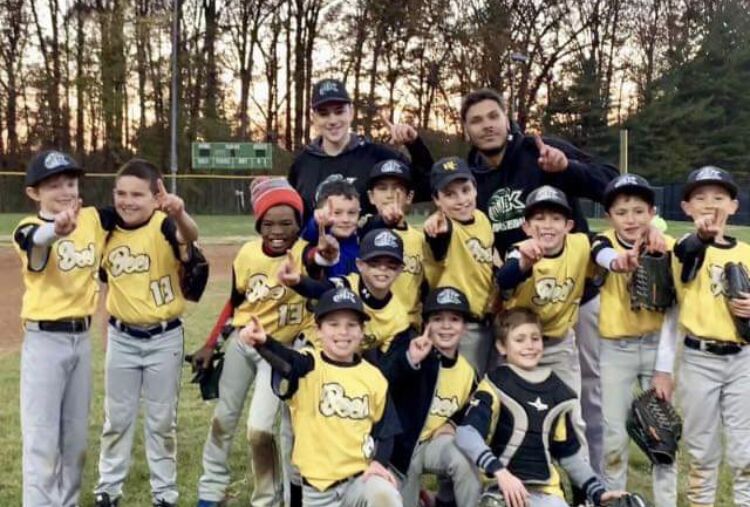From player to coach: seniors come back to the game
Senior Nate Schaefer and coach Oscar Espinal with their 3rd grade team, the Bees. The team won the Koa Sports BABL (Bethesda Area Baseball League) Championship game. Photo courtesy Schaefer.
April 4, 2019
On most Sundays from December to early February, senior Thomas Fratantoni stands on the sideline of a local elementary school basketball court, surrounded by 12 4-foot-6-inch boys. He shouts out line-ups and plays, gives the players personal feedback on the bench and helps guide the team to a victory. Fratantoni’s own game starts four hours later with his recreation team, the Neon Indians.
Fratantoni works for Tru2Form Hoops, an organization that provides skills training to young basketball players. He’s been involved with the company since the second grade—where he began as a player himself—and continued to play on the AAU travel team until ninth grade. When Fratantoni stopped playing basketball, he didn’t want to entirely cut out basketball from his life. He worked as an assistant coach for two years, but this year, he serves as head coach of a third-grade team.
“You have to make sure that you are a leader for that team,” Fratantoni said. “Each game has its challenges, so people might not be scoring or defending. Your job as a coach is to make sure that you get the kids to play hard and eventually win.”
Similarly, senior Nate Schaefer has coached third grade youth baseball for Koa Sports since the ninth grade. Koa is an organization which helps kids develop and improve their skills in a variety of different sports through organized teams and skills clinics.
This year, Schaefer has a double period internship at Koa Sports. The atmosphere is unlike any other office place, he said. Co-workers often joke around and lightheartedly “trash talk” about who has the best team.
Fratantoni and Schaefer both started coaching as a way to relay their passion for their sport to younger players. Their goal is to maintain the athletes’ level of passion and dedication throughout the season and keep them engaged in the game, Schaefer said.
“At the end of the end of the day, I want them to win,” Schaefer said. “I’ll give them the tips that they need and the advice that they need. I try to make it fun and casual, though, because what’s the point in a sport if it’s not fun?”
Being on the sidelines has given Fratantoni the opportunity to see the game from a new perspective, he said. It’s allowed him to see the involved decision making that comes with calling just one play or motivating one player—something that he never considered when he was on the court.
Fratantoni and Schaefers’ age has earned both encouragement and criticism from parents and spectators. Schaefer started off the season with players’ parents doubting his presence in the dugout. As the season continued, however, players and parents started to see how age didn’t restrict his ability to lead the kids and fight against “questionable” calls by referees.
The parents congratulate Fratantoni on wins and support him after losses. His age often makes parents impressed with his abilities as a coach, but it also sometimes leaves eyebrows raised, he said.
It’s important to Schaefer that the players see him not just as a teenager, but as a coach. Oscar Espinal, who coaches alongside Schaefer, thinks that Schaefer has not only kept the kids in “high spirits” but has also gained confidence in his abilities as a leader.
“He started out timid,” Espinal said. “Nate was hesitant to take initiative in giving kids proper instruction. [But] with every practice and game, he quickly shed hesitation. As the season progressed, so did his credibility.”
Fratantoni has learned from his mistakes each year. During his first season, he tried to be the “nice guy” and joke with the kids. Needless to say, they had a losing season. The next season, he arrived with a strict “Don’t smile until Thanksgiving” attitude, and they finished the season with a 7–1 record.
Fratantoni, despite being tough at times, has a truly special bond with his players, he said.
“I didn’t know any of these kids at the start, but helping them develop as a player is amazing to see,” Fratantoni said. “It’s truly special when everyone knows what we’re working towards and what our end goal is. There are certain games that you feel like no matter how hard you try, nothing seems to be working. You need to trust yourself and your team’s ability.”
In one game last season, the team trailed by 13 points in the first half. A normal game usually includes a team scoring 15 points overall. During halftime, Fratantoni gave the team a pep talk encouraging them to never give up and always fight back. They came back and won the game on a three-point buzzer beater, a memory that will always stick with him, he said.
Schaefer doesn’t know what he wants to do in college, but he knows that coaching will be a part of his life again; it reminds him of when he started playing baseball and experienced the thrills of playing a new sport, he said.
“The opportunities and training that Koa gives to kids in this area are great,” Schaefer said. “The practices and everything that goes into planning is something that I have a lot of respect for. I will never give up coaching. It’ll be in my life in the future one way or another.”
Fratantoni plans to possibly turn coaching into a career. He would like to coach professionally but isn’t sure how to get there. Right now, he’s considering being a high school teacher and coaching basketball at the school.
In the meantime, he said he aims to foster a love of basketball and keep pushing the kids to reach their full potential.
“I want kids to love the game first and foremost. Seeing kids become more confident and vocal on the court, I consider that a victory above all else,” Fratantoni said. “It’s truly one of the most fun things I do. People think that it must be so frustrating having to deal with kids, and it is tough. But, it’s always a challenge that I’m ready for.”










Peyton • Apr 12, 2019 at 8:49 am
Great article about some outstanding young people doing good things out there. Giving time for others to benefit is just terrific.
well done guys